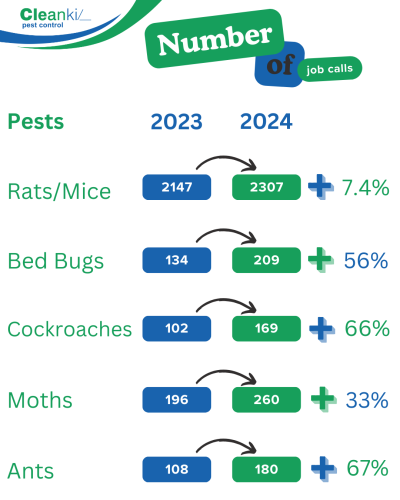Pest control is an ever-changing industry. Various factors influence the types of pest we are asked to deal with. Based on the number of call-outs we have received over the last couple of years, we have seen a notable increase in ant, cockroach and bed bug infestations. But why has there been an increase in these creepy crawlies and is this growth going to continue?
Ants
These small but mighty insects are one of the most common pests in the UK. They invade our homes, gardens and public spaces and carry harmful bacteria. Not only that, they can also damage the foundation of our homes. They do this by digging through wood, insulation and widening cracks in walls. The increase in ant problems is due to a number of factors. Like many other pests, climate change has seen a surge in ant numbers - the warmer temperatures have extended their active season allowing them to thrive for longer periods. Urban sprawl provides more suitable habitats for ants as they have fewer natural predators and easy access to food. As our towns and cities continue to grow and temperatures continue to rise, you can expect ant populations to further increase.
How to prevent them from invading your home or business
Crumbs, spillages and leftover food are the equivalent of ringing the dinner bell for ants. So, make sure food is stored properly and keep areas, especially the kitchen, clean. Make sure rubbish is regularly taken out and pet food is sealed.
Cockroaches
Cockroaches are becoming more common in the UK, especially in food and drink premises, and they’ll infest any building as long as it's warm and has a source of food. These sneaky pests usually enter through pipes and are great at hiding. Cockroaches are attracted to warm environments so, again, climate change is having an impact on the increase of infestations we are seeing. Once in your home, they quickly reproduce which is when they become a big problem. They present a significant public health risk as they carry diseases such as dysentery, typhoid and salmonella.
How to prevent them from invading your home or business
Very similar to ants, maintaining a clean home and ensuring food is correctly stored will help prevent an infestation becoming established. Ideally, avoid bringing in secondhand furniture, especially fridges and freezers. Check food deliveries and foodstuffs. In some instances, it may be worth attempting to seal any entry points, around doors and windows, as well as focusing on your drainpipes.
Bed Bugs
Bed bugs are another big problem we have in the UK. These pesky pests are not only gross, but they can also cause serious health problems. They are well known for leaving nasty, itchy bites that look similar to mosquito bites. The bites can then lead to skin infections such as cellulitis and impetigo from scratching the bites. The most common signs of bed bugs are bites and spots of blood on bedsheets. One of the reasons why we have seen such an increase in bed bugs recently can be explained by the sudden increase in travel post-pandemic. When we travel abroad to countries with high levels of bed bugs, we can unknowingly bring some little unwanted souvenirs back with us - even leaving our suitcases open can provide a nice ride home for these pests.
How to prevent them from invading your home or business
There are some simple precautions you can take to help prevent these creepy crawlies hopping into bed with you. Be mindful when travelling, as they are often collected in hotels and hostels! Reduce clutter from around your bed so there are fewer places for the bed bugs to hide. Wash your bedding, clothes and curtains in the hottest water your washing machine allows and dry them on a high heat. Scrutinize secondhand furniture. We all love a bargain and second-hand furniture and rugs may be beautiful, but be cautious and inspect closely for any signs of bed bugs. Steam clean or vacuum before bringing second hand items into your home.
What does this mean for the future?
As temperatures continue to rise and the world becomes more accessible, it seems pest populations will continue to rise - so keeping on top of pest control and being alert has never been more important.
For more information on any of these pests, or if you are concerned about an infestation, give our friendly team a call on 0800 056 5477 and they’ll be happy to help.
